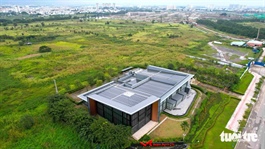Experts say developing a legal framework for joint real estate investment in Việt Nam will be difficult
Experts say developing a legal framework for joint real estate investment in Việt Nam will be difficult
Experts say that developing a legal framework for joint real estate investment in Việt Nam will be difficult, despite the laws on land, housing and real estate that took effect at the beginning of August.

Thorough consideration is needed to ensure legal compliance and investor safety of the joint real estate investment model in Việt Nam. — VNA/VNS Photo |
These laws are expected to be a big step forward in promoting the healthy, transparent and sustainable development of the real estate market, experts have said.
Việt Nam has not yet created separate regulations on blockchain-enabled joint real estate investments, although several models have recently been adopted by companies, according to Huỳnh Minh Quân of the Faculty of Law at Sài Gòn University.
As high initial investment value and low liquidity were considered major barriers preventing individual and institutional investors from participating in large-scale projects with stable cash flow in Việt Nam, joint real estate investment models had been launched in early 2020 and received significant interest from investors, especially during the COVID-19 pandemic.
In February 2020, Cen Group poured US$1 million into technology platform Revex, which aimed to connect property developers and investors, focusing on individual investors who could invest from VNĐ1 million (US$40.20).
In 2021, Moonka Limited Company introduced the blockchain–enabled platform Moonka, which divided townhouses with house ownership certificates into 1,000 parts so that investors without a large amount of capital could participate.
In 2022, Vingroup established VMI Real Estate Investment and Management Joint Stock Company to invest in Vinhomes real estate and then dividing it into 40 parts so that investors could fund each part through the company’s online trading platform.
The latest move is by VP Securities (VPS) and Fnest in June this year, which joined to divide villas into parts and enable investors to acquire a stake in the real estate assets with a minimal outlay of just VNĐ10,000 per share through the VPS app SmartOne. The State Securities Commission (SSC) ordered a halt of the model due to the absence of a legal framework and risks to investors.
Thorough consideration of the joint investment model is needed to ensure legal compliance and investor safety, the SSC said.
Deputy Minister of Finance Nguyễn Đức Chi said that while there was no explicit prohibition, the models must operate within licensed sectors and industries. If they fall outside the authorised scope of current laws, the operation must be halted for a comprehensive assessment.
According to lawyer Nguyễn Văn Lộc, chairman of LP Group, when completing joint real estate investment transactions via blockchain – enabled platforms, investors are often asked to transfer money into e-wallets integrated into the platforms.
Raising funds via e-wallets can be considered illegal because intermediary payment via e-wallets -- whether provided by Vietnamese or foreign entities -- must be licensed, he said.
He pointed out that, in fact, numerous companies have taken advantage of joint investment models to illegally raise capital from investors.
According to Quân, with regard to established regulations, joint real estate investment models are faced with two major legal problems.
First, it is a big legal risk, because investors do not have actual ownership of the real estate assets when investing in smaller parts of the assets. Under current law, the legal recognition of land use right certificates and ownership of assets as well as the principle for granting the certificates does not change.
In the joint real estate investment model, having hundreds or thousands of investors own part of the property asset is not explicitly prohibited. However, investors are just holding a “tokenised real estate asset” which has no legal validity. In other words, buying and owning tokenised real estate assets does not mean legally owning the real estate assets.
In fact, the joint real estate investment model via blockchain platforms can be understood as a form of capital raising, in which companies divide the capital into small parts for easier and more flexible capital mobilisation. Capital contributors do not own or have their names on the ownership certificates. Thus, there is no legal binding contract between the buyers and the sellers, Quân said.
Second, the existing regulations on electronic transactions do not include these types of transactions. The joint real estate investment model creates a risk of cross-border investment that might go beyond Vietnamese laws and regulations, he added.
“It’s relatively difficult to legalise the model at present. However, with the rapid development of digital technology, businesses are increasingly creative in establishing new investment models, posing an urgent need to build a basic legal framework to protect the legitimate rights and interests of related parties,” Quân said.
Quách Thành Lực from the Hà Nội Bar Association said that the legal framework is failing to keep pace with the development of new business models. The model of joint real estate investment via blockchain platforms is completely different from ownership under land use right certificates.
According to Cushman & Wakefield, while this model is relatively new in Việt Nam, it is not a stranger to the global financial market. The most popular model is a real estate investment trust fund (REIT).
In Việt Nam, the first and only REIT is TCREIT, announced in 2021 by Techcom Capital. REIT certificates are still not a popular investment product in Việt Nam due to the incomplete legal framework.
Cushman & Wakefield’s data shows that a total of 225 REIT products were active in the Asian market as of 2023, with a combined market valuation of $252.1 billion.

























